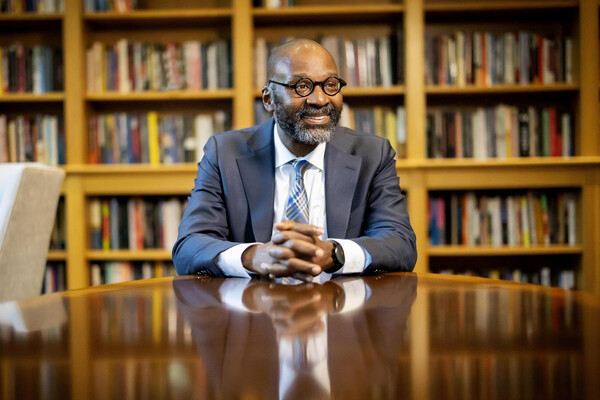
Griffin Pitt, right, works with two other student researchers to test the conductivity, total dissolved solids, salinity, and temperature of water below a sand dam in Kenya.
(Image: Courtesy of Griffin Pitt)
Ernesto Pujol does a lot of walking, but he still laughs in near disbelief when he recalls the 25-mile trek he took through San Juan, Puerto Rico, earlier this summer.
It was the third day of an eight-day trip with a group of Master of Fine Arts students from the Weitzman School of Design, and the culmination of a seminar that Pujol, the 2020-2021 Keith L. and Katherine S. Sachs Visiting Professor in the Department of Fine Arts, offered in the spring. Co-led by Pujol, along with Puerto Rican designer María de Mater O’Neill and architectural historian Jose Silvestre, senior conservator of the Institute of Puerto Rican Culture, the students walked through the city engaged in a process of listening, both to the urban spaces of San Juan and the colonized ecology of its post-industrial hinterlands. It was an experience that echoed themes that have threaded through Pujol’s work going back to the 1990s.
“I have a project that is called The Listening School which plays with the notion that, historically, art speaks and audiences listen—the artist speaks and the public listens. But what if you turn the tables on that, and what if artists were public listeners, public servants of listening?” Pujol says. “What if the work of art was not a moment of preaching or lecturing but was a vessel that somehow harvested and thus contained the voices of the public?”
Pujol carefully curated the trip to Puerto Rico as the capstone to his visiting professorship and the performative exercises he led with students throughout the spring semester. It was designed to immerse students in the ecology of the island, a U.S. territory, and to introduce them to a diverse network of interdisciplinary professionals whose work is engaged with restoring the human and natural environments.
During the first two days, Pujol and the students visited two nature reserves owned by the Conservation Trust of Puerto Rico, Para la Naturaleza, which served as the trip’s primary partner and host, at former sugar and coffee plantations once operated through the labor of enslaved Africans, as an introduction to the colonial agricultural economy of Puerto Rico. On the third day, the group followed the path of a watershed from the outskirts of the city into its heart. Along the way, they encountered the various crises of contemporary Puerto Rico, from hurricane-related environmental damage to urban poverty, degraded infrastructure, and political upheaval due to government corruption and bankruptcy.
“We walked through the ruins of imported American modernity,” Pujol says. “But if you immerse young people into the gorgeous environments of the tropics and then you walk them into a real crisis, you can’t leave them there.”
Read more at Weitzman School News.
From the Weitzman School of Design

Griffin Pitt, right, works with two other student researchers to test the conductivity, total dissolved solids, salinity, and temperature of water below a sand dam in Kenya.
(Image: Courtesy of Griffin Pitt)

Image: Andriy Onufriyenko via Getty Images

nocred

Provost John L. Jackson Jr.
nocred